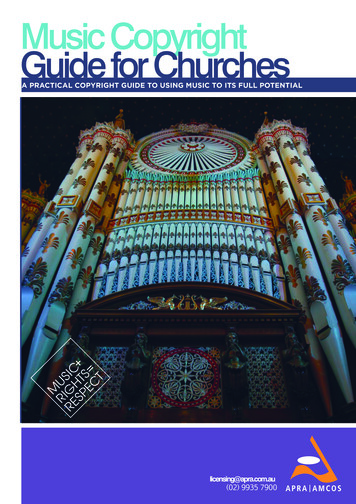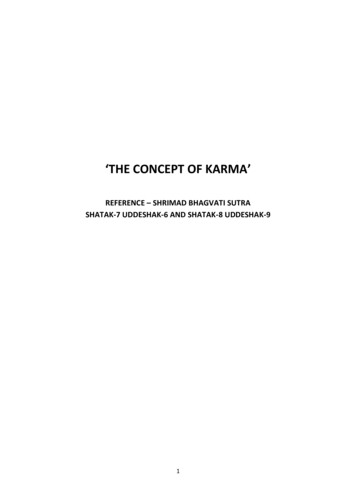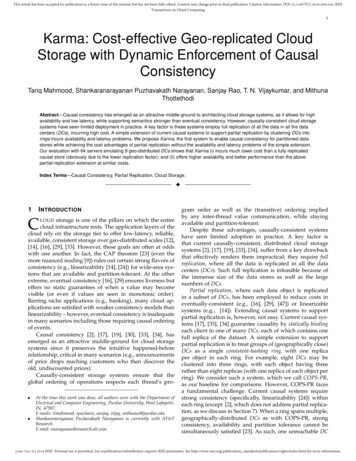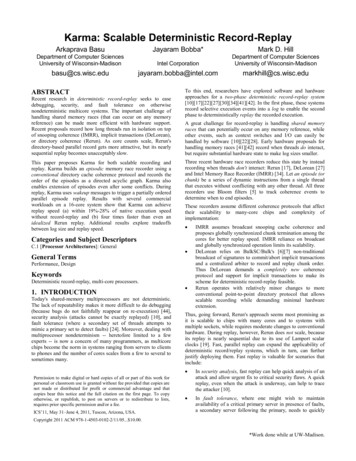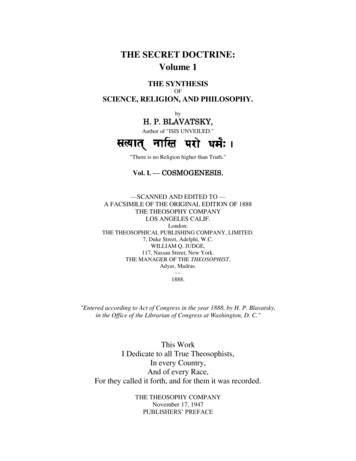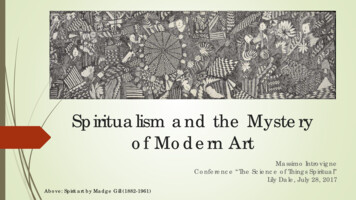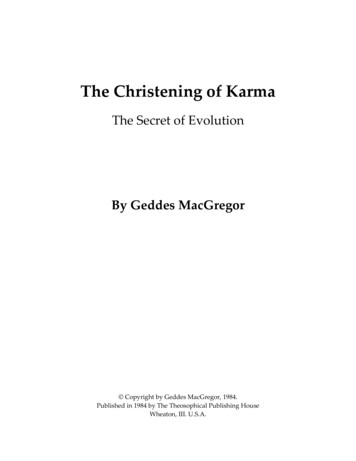
Transcription
The Christening of KarmaThe Secret of EvolutionBy Geddes MacGregor Copyright by Geddes MacGregor, 1984.Published in 1984 by The Theosophical Publishing HouseWheaton, III. U.S.A.
Contents1Evolution and Karma12Evolution as Universal93The Moral Dimension of Evolution254Grace Surprises405The Christening of Karma526Karma and Freedom637Evolution, Karma, and Rebirth708Human Sexuality and Evolution809Stages in Spiritual Development9310Our Kinship with All Forms of Life10411Evolution and God11512Evolution and the ʺBlessed Assuranceʺ12513Karma, Evolution, and Destiny134
Chapter OneEvolution and KarmaEvolution is not a force but a process: not a cause but a law.John Morley. On CompromiseWhat avails it to fight with the eternal laws of mind, which adjust the relation ofall persons to each other, by the mathematical measure of their havings andbeings?Emerson. Spiritual LawsIn the course of my teaching and lecturing in universities and other institutions, Ihave discovered during the past decade or more an increasing interest in the concept ofkarma. It comes out in discussion at the slightest provocation and indeed sometimeswith no detectable provocation at all. It is not always well understood. Too often it is soill understood as to be taken for a kind of fatalism, which it certainly is not, being on thecontrary a freewill doctrine, although it is much else besides. Yet, understood well orbadly, it commands a lively interest, not least on the part of young people who twentyyears ago would not have generally found it so challenging to their outlook on life.The connection of karma with evolutionary thought is not by any means alwaysimmediately apparent to those whom the concept of karma so fascinates. Yet theconnection is crucial if karma is to be seen as a deeply spiritual principle at the heart ofall things. To those who understand and accept the karmic principle, biologicalevolution, as Darwin and others have expounded it, is only a pointer to a far morefundamental evolutionary principle in the very mind of God.Most Christians, though by no means all, have come to see no incompatibilitybetween biological evolution and the Bible. Many, however, see the karmic principle asalien to both the Bible and the Church. True, the Sanskrit word karma is unfamiliar, butthe concept, as we shall abundantly see, is at the root of the Judaeo-Christian tradition. Iwish to argue, in this book that evolution and karma can be christened at the same font.Nor will they have been the first heretical-sounding ideas to have been so received.The Christian Church’s debt to heretics is incalculably great. The theory of NicholasCopernicus (1473–1543), the father of modern astronomy, that the sun does not moveround the earth but the earth round the sun, was supported by the investigations ofGalileo Galilei (1564–1642). In February 1616 the consulting theologians of Rome’s Holy1
Office condemned the Copernican theory as heretical, since it appeared to beincompatible with certain biblical passages that refer to the sun’s rising and setting andeven to the sun’s having stood still for a brief period at Joshua’s command (Joshua10.12–14). Shortly after this ecclesiastical condemnation, Galileo was ordered not “tohold teach or defend” the condemned proposition that the earth moves round the sun.For some years Galileo remained silent on the subject, but eventually the publication ofhis now famous Dialogo in 1630 led to his being handed over to the Inquisition in 1633and, under threat of torture, forced to recant. He was condemned to imprisonment butreleased after some months and allowed to return home to Florence. The ban on theCopernican theory, which had caused the work of Copernicus to be put on the Index ofProhibited Books (that is, books that the faithful are not permitted to read withoutspecific permission) was not removed till 1787, eleven years after the AmericanDeclaration of Independence.Surely, no one today would see the now well-established view that the sun is at thecenter of the solar system and that the earth moves in orbit round it as in any wayirreconcilable to the Bible, or in any sense detrimental either to the Christian or to anyother religious faith. Not even the most literalistic of Bible readers would find anyground for resisting the acceptance of this basic tenet of modern astronomy or indeedsee any need to oppose it in the interest of protecting or defending religious faith. Onthe contrary it is a view that is taken for granted as much by believers as by unbelievers.I know of no one with even the most elementary knowledge of astronomy who wouldfeel the slightest need to disown this basic astronomical view as incompatible withanything in the Bible. Most educated believers, indeed, would see this along with muchelse in modern astronomy as intensifying and enriching their religious faith rather thanin any way threatening or impoverishing it.The “natural” sciences (physics, chemistry, and biology, for example) are by nomeans a threat to religious truth. In the Middle Ages, when the Arab world was thefocus of much scientific and mathematical inquiry and discovery, the truths disclosedseemed at first sight incompatible with the teaching of Islam as set forth in the Qur’ān.When, in the twelfth century, the discovery of Aristotle who represented “science” tothe medieval Christian mind, alarmed churchmen, the prospect of reconciling him withthe Bible looked at first dim indeed. In the following century, however, ThomasAquinas not only reconciled much of Aristotle’s science with the Bible and the teachingof the Church but showed with skill and brilliance that Aristotelianism enhanced ratherthan diminished the spirituality of the Church’s treasure house. The marriage of“science and religion” in Thomas’s work was eminently successful in terms of his day.Although enormous advances have been made since then, both in scientificinvestigation and in understanding and appreciation of the message of the Bible and the2
teaching of the Church, scholars now recognize the immense philosophical andtheological acumen of Thomas and other medieval schoolmen and the light they shedon the intellectual problems of their time. They are no more to be despised for it (as forsome centuries they were) than Christopher Columbus is to be disdained for havingused the Santa Maria rather than a fast liner or a jumbo jet to cross the Atlantic.From the standpoint of a modern scientist, one of the most obvious handicaps ofmedieval thinkers such as Thomas Aquinas and Duns Scotus is that they knew nothingabout biological evolution. This did not merely obscure to them one or another aspect ofthe range of the knowledge we have today; it distorted their knowledge at a level soradical that their ignorance of it affected virtually everything in their thought. When wego on to reflect that until the speculations of Kant in his General Natural History of theHeavens published in 1755, not only religious people but scientists with no religious axeto grind, took a very static view of the universe around them. Archbishop James Ussher(1581–1656), as is well known, fixed the date of the creation of the world at the year 4004B.C. John Lightfoot (1602–1675) improved on this dating, having worked out not onlythe exact day but the hour. Friday, October 23, at 9 a.m. Even the great Isaac Newton(1642–1727), however, although he did propose in a private letter that the solar systemcould have evolved from a more primitive distribution of matter, seemed to see no needto pursue any such hypothesis. Kant was the first thinker to take the idea of cosmicevolution seriously; but his work on this subject attracted little attention. Pierre Simon.Marquis de Laplace, in his Exposition du système du monde, published in 1796, proposedthe nebular hypothesis, and other scientists suggested various theories that also impliedsome sort of evolutionary notion. The Scottish Lord Monboddo (1714–1799) in his TheOrigin and Progress of Language, published in 1773, entertained a remarkably interestingevolutionary speculation that brought man into the same species as the orang-outang;but his work on this subject found little or no acceptance among his contemporaries.Among biologists, Jean-Baptiste de Monet the Chevalier de Lamarck (1744–1829), maybe accounted the first to take a clearly evolutionary view of the origin of man. His workwas overshadowed by that of Charles Darwin, whose extremely influential book, TheOrigin of Species, published in 1859, soon revolutionized biological thought throughoutthe civilized world.Opposition to Darwin came swiftly and bearing a religious banner. At a meeting ofthe British Association on June 30, 1860, the Bishop of Oxford, Samuel Wilberforce,whose persuasive oratory had earned for him the nickname “Soapy Sam,” attacked it inthe name of Christianity. That now notorious incident occurred some sixty-five yearsbefore the now even more notorious Scopes trial in Tennessee.3
As time went on, however, thoughtful believers began to see that evolution couldmean far more than having a simian ancestry and repudiating the literal interpretationof the Genesis account of creation as a six-day opus. They saw, too, that althoughDarwin, as a scientist, simply reported his findings and that these findings suggested thelack of any divine activity in the process of evolution, there was no more reason torepudiate religious belief on account of Darwin than there had been to reject it somecenturies earlier on account of Galileo.The Darwinians were properly concerned only with biological evolution; but whatif there be a process of spiritual evolution that requires biological evolution as itsantecedent? That is precisely what many discovered, having used the Darwinian theoryas a catalyst for the discovery. Evolutionism so molded late nineteenth-century thoughtas to make it impossible for any well-educated person to avoid its all-pervasiveinfluence.What practical difference does it make in our daily lives now? That is almost likeasking what difference it makes to see the earth in orbit round the sun rather than thereverse, as in the geocentric theory once very widely held. What difference does it maketo know, as we now do, that the solar system itself is but an out-of-the way backwaterin the indescribably immense universe? What people know about quantum physics andthe theory of relativity, even at the most popular level, affects them at every point. Eventhough a person spend a whole lifetime between a little room and the village storebelow it, such knowledge transforms the entire outlook of that person, transmogrifyingthe quality of his or her daily living.An understanding and appreciation of the evolutionary principle, however, affectsme even more intimately and personally, because it so directly concerns the existentialsituation in which I find myself: my origin and my final destiny as well as the why ofmy being here right now. If evolution is both biological and spiritual, I am in the midstof a divine process directly touching me and all around me. I become an agent in theprocess, not a mere puppet in a divine drama.Far more than all that: evolution directly affects my personal destiny, for I can nowsee myself as evolving. I am growing, developing. Not only does this attune me to thegrowth and development of plants and animals around me; it attunes me to the divineactivity within me and encompassing me. Above all, I become aware of the possibilityof my making a qualitative “vertical leap” that will raise my consciousness to startlinglyhigher levels of awareness. Moreover, I can see such sudden spurts of spiritualadvancement in my past. Finally, and by no means least, I can see more clearly thedangers that attend spiritual advancement and the steps that must be taken to avertthese dangers. Besides, I recognize that nothing in all this requires me to renounce4
anything of spiritual value contained in what I have ever accepted as God’s revealing orunfolding of himself to me. I see both how far I have come and how far I have to go andabove all the importance of all that I do here and now. Indeed, whereas I had been amere passenger in a bus, now I am flying my own plane.Of course it is possible to restrict evolution to the life process in a naturalistic way,ignoring or repudiating moral and spiritual dimensions as mere dreams of the humanbrain. Recognition of the evolutionary process does not in itself force us into a religiousor an irreligious stance, into belief or unbelief in this or that religious affirmation. WhatI shall try to show in this book is that an evolutionary understanding of the universe,including ourselves, immensely enlivens and deepens whatever disposition to religiousbelief we may be willing to entertain and whatever spiritual perception we may in anycase enjoy. This, I shall contend, is true irrespective of the way in which we maysymbolize God; that is to say, it works for Parsee as for Buddhist, for Muslim as forHindu, for Christian as for Jew. Since I am writing primarily for people whose roots liein the West and whose thinking is therefore in a Western mold, my examples will beoften from Christian thought and experience; but this should not obscure theuniversality of the principle I seek to establish.In some religious circles today it is fashionable to set creation and evolution each inopposition to the other as though the one excluded the other. On the contrary, on theview I am to present, the creative process is evolutionary in the sense that it is the wayGod does things, and evolution is creationist in the sense that it is eternally governed bythe heart and mind of God who is at the core of all things, being (as Aristotle in his ownway saw long ago) the eternal principle that like a magnet draws all things to itself. Byrecognizing the evolutionary character of all things, we can be led to perceive that thatprinciple is both suprapersonal and supraimpersonal, both far beyond our ken “in lightinaccessible” and permeating all things to their uttermost edges, setting the Kingdom ofGod indeed within us.The notion that evolution sets “science’ at enmity with “religion” is a conspicuouslymisguided view. Those whose fears lead them to canvass it show in doing so that theydo not know their foes from their friends. An evolutionary interpretation of theuniverse such as modern physicists, astronomers, and biologists find themselvescompelled to make in face of the evidence confronting them sits much better with aview such as the traditional Judaeo-Christian one than a “static,” non-evolutionary one.For if we found the universe to be not evolutionary but “static,” we could find it mucheasier to interpret as simply and inexplicably eternally there with no need of a divineBeing either behind it or within it or both to sustain and order it. It could not beotherwise than it is, and so the famous question posed by Leibniz in the seventeenth5
century and by Heidegger in the twentieth, “Why is there anything at all and not justnothing?” would be indeed a pointless if not meaningless question. If, however, theuniverse is evolutionary as the basic modern sciences show it to be, then it is muchmore plausible to say that it is as it is not by necessity but by some sort of decision orchoice. Of course this certainly does not “prove” that there is a divine Being behindand/or within it; but no less certainly does it make such a view at least possible and tosome even probable. Furthermore, if you do take the view that God is behind and/orwithin the universe, you will find it eminently congenial to go on to perceive him asfreely choosing to have the universe the way it happens to be rather than as a staticentity somehow existing of necessity. So while surely no one with any philosophicaltraining and scientific understanding at all would pretend that the principle ofevolution leads inevitably to the view that God is behind and/or within it, evolutionshould most emphatically never be deemed by any educated person to be somethingthat religious people should attack as hostile to religious belief.The ancient concept of karma fits so well into a general evolutionary understandingof the universe that it may be considered the “law” underlying any spiritualinterpretation of the evolutionary process. Those in the ancient world who understoodit as it was generally presented in Indian thought did not know, of course, of biologicalevolution in terms such as have been used in the exposition of Darwinian theory. Yet intheir own way they did see an evolutionary principle at work; hence their sense of thecontinuity of human with lower forms of life and their reverence for life in all its forms.When, in the nineteenth century, the scientific community was convinced of thefundamental truth of Darwin’s theory of evolution, a renaissance among religiousminded people of the notion of the karmic principle was to be expected. We find itappearing in a variety of forms in European and American literature. In the last quarterof that century, after the foundation of the Theosophical Society in 1875, interest inkarma was further developed.Karma, as we shall see over and over again in the course of our present study, isinseparable from the spiritual side of the evolutionary coin. It is the principle ofevolution understood in specifically moral terms. While its workings extend to allstages of development, its effect on our personal lives can be seen ever more clearly aswe advance in spirituality. Karma is much more than a principle of justice, although itincludes that as one of its many aspects. It is a principle of harmony and reason andlove at the heart of all things. It manifests itself to us in many ways, not least in ourpersonal endowments and capabilities as well as in our personal circumstances. Fromits workings is derived, for example, the temperament with which we are born as wellas the love or lovelessness with which we find ourselves surrounded in our formative6
years. In the thought of those who see themselves as pilgrims on a spiritual path, karmaand evolution go together as two halves of the same scissors.Since the primary focus of our concern in this book is to consider how conceptssuch as evolution and karma can be legitimately reconciled to Christianity, we mustdeal with an obvious objection before we go any further. The objection may be stated asfollows: what warrant can possibly be found in the Bible, which all Christians, in oneway or another, recognize as the primary documents of their faith? In the absence ofsuch a warrant, how can anyone dare to propose the christening of such ideas?Certainly one would look in vain in the Bible for an evolutionary understanding ofthe universe, either in physical, biological, or any other terms. Likewise, the doctrine ofkarma (although, as we shall see, it is often implied) is not to be found expressly statedas such in the Bible. No chapter-and-verse authority for the christening of karma andevolution could ever be provided.To this objection the reply must be a tu quoque. The doctrine of the Trinity, which isat the very heart of Christian orthodoxy and taken in mainstream Christian traditions tobe the test for admission to the Church by baptism, is nowhere in the Bible set forth assuch. (The verse I John 5.7 is known to be a very late addition to the biblical text, notfound in any of the ancient manuscripts.) Many of the doctrines that are accountedimportant in various central traditions of Christianity may be extrapolated fromScripture but are certainly not set forth there in the form in which they are presented inthese traditions. The doctrine of the Trinity, in anything like the shape in which it ispresented in the formulas used at Christian baptism, cannot be said to have beenformulated earlier than the Council of Constantinople in A.D. 381. But then the NewTestament itself did not take anything like its present shape until about the year 200 andsome books, such as Hebrews, were disputed for long after that, while others, such asBarnabas and the Shepherd of Hermas, which are found in some of the great earlymanuscripts, were dropped. Even the contents of the Old Testament, as it is known toProtestants today, were not settled in Jewish tradition till about sixty years after thedeath of Christ. Moreover, this, the “Hebrew canon” of Scripture, does not include allthe books of what the New Testament writers, for example, recognized as Scripture,since they used the Septuagint, a Greek version made about 250 B.C.E. for the Jews of theDiaspora. What, then, precisely, do we mean by “the Bible”?Such questions are plainly far too complicated to be dealt with in any simplisticway such as demanding biblical proof texts. While Christianity needs a focus oftestimony to the claims of Christian faith and this focus is rightly sought in Scripture,the Bible must be interpreted in one way or another and the principles of interpretationare, of course, open to question. To expect a mention of evolution or karma in the Bible7
is almost like expecting to find in it authority for the use of telephones or computers.Yet such concepts as evolution and karma can shed far more light on the meaning of thebiblical message than any technological device could accomplish. We should thereforeapproach them with lively interest and curiosity, whether we account the Bible as of noparticular importance or revere it as containing the very Word of God.8
Chapter TwoEvolution as UniversalA fire-mist and a planet,A crystal and a cell,A jelly-fish and a saurian,And the caves where the cavemen dwell;Then a sense of law and beauty,And a face turned from the clod –Some call it Evolution,And others call it God.William Herbert Carruth. Each in His Own TongueWhen the concept of evolution is mentioned most people’s thoughts turn toDarwin’s The Origin of Species. Naturally so, for Darwin’s scientific work, controversialat the time, turned out to be epoch-making. His work was nevertheless also a catalystfor a much wider development that went far beyond the biological realm.Let us look first, however, at the view to which Darwin’s patient researches led him.Afterwards we shall consider his influence on later speculative thought about evolutionas a universal principle of Being and consider also the antiquity of evolutionary theory.Darwin, an indefatigable collector of facts, amassed an enormous amount ofevidence to show that, historically, biological evolution has in fact taken place and thathumanity is a product of it. The interpretation of this finding was and is plainly ofcrucial importance to those who believe in divine creation, since either evolution mustbe reconciled with such divine creation or else we must abandon the one or the other.The evidence Darwin amassed was overwhelming and has thoroughly convinced thescientific community. Moreover, he showed that evolution could be accounted for interms of purely “natural” causes. That is to say, there is no logical necessity for bringingin the notion of divine creation. Above all, he showed that the situation as we nowknow it cannot be accounted for by any hypothesis other than an evolutionary one. Heand his contemporary A. R. Wallace simultaneously discovered the principle of naturalselection, which very simply stated is the survival of the fittest in the struggle forexistence. Precisely what is to be understood by “the fittest” demands interpretation;nevertheless, whoever they are, it is they who survive. Variation, heredity, and thestruggle for existence combine in the evolutionary process. It is to their combinationthat he gave the term “natural selection.” Let us look at these in turn before we go on.9
First, variation: the fact that every individual is different from every other isextremely important. Of course dogs breed dogs and cats cats; yet within the same litterstructural and functional differences can be observed. No less obviously, individualorganisms are modified by environment. Differences in light and soil, for instance,affect plants, as every gardener knows. Still, whether the differences found in humanbeings and other higher animals can be entirely accounted for in such simple terms is,to say the least, questionable.Second, heredity: there is no doubt that heredity plays an immense role inevolution. How mutations occur is not even now entirely clear. Geneticists dispute thenature of the process. But that they do occur and are observable is beyond dispute.Some organisms change very slowly over enormous ranges of time; others change quiterapidly. Genes, chromosomes, gametes, homozygotes, and heterozygotes all play theirparts. To specify with precision the cause of the mutations is, however, not by anymeans easy.Third, struggle for existence: such is the vastness of the scale of reproductionalongside the fierce competition for space to live and the means of survival that only asmall percentage of organisms do in fact survive. Bacilli and other microscopicorganisms reproduce so rapidly and extensively that if one strain could somehowescape destruction by its competitors it would be able to take over its entireenvironment. Destruction is necessary to the evolutionary process, which is essentially aselective one. Again, the intensity of the struggle varies according to circumstance andplace.In view of a common misapprehension about the Darwinian theory of evolution,we ought to note carefully that Darwin expressly excluded the notion that naturalselection necessarily implies a universal law of advancement or development. What itdoes, according to Darwin, is to take advantage of such variations that do arise and arebeneficial to each creature under its complex relations of life. In other words, theevolutionary principle is one of adaptability. That species survives that is the mostadaptable. Whether adaptability implies progress is another question. Certainly thestrong do not necessarily survive; otherwise the dinosaur and the sabre-toothed tigerwould surely have fared better than they did and man would have been extinct longago. So the race is not always won by the strong. It would seem to be won, rather, bythose skilled in adapting to circumstance; but then these would appear to be mentallystrong in the sense of being skilled in the art, not so much of savoir vivre as of savoirsurvivre. These might be the cunning, the selfishly shrewd, and by no means necessarilythe most noble in character. If the meek do inherit the earth, then, according to Darwin,it must be because meekness is a clever strategy, not because it is typical of an10
“advanced soul.” So then, if we are to go beyond Darwin’s view we really do so undersome banner other than the Darwinian one. Nevertheless, Darwin’s theory may becompatible with some other interpretation of the nature of evolution.We should also note that Darwin had immediate predecessors who in one way oranother dealt with evolution along lines that might be said to have portended his own:Georges Louis Leclerc, Comte de Buffon (1707–1788), and Lamarck (1744–1829).Darwin’s own grandfather Erasmus (1731–1802) also may be said to have foreshadowed(at least to some extent) his illustrious grandson.The process of biological evolution is incalculably complex. Darwin himselfperceived this and the work of later biologists has certainly not tended to reduce thecomplexity. Innumerable factors play their parts. Leaps seem to occur, moreover, inunpredictable ways. These critical turning points are no mere mutations. The movefrom atom to molecule, for instance, surely cannot be called mere mutation: the changeis not so much a change of characteristics such as a change in a mammal from a roundto an elongated head. It is more radical, more a movement to another dimension ofBeing. Then what of the leap from the inanimate to the animate, the emergence of life?Pass many millions of years and behold the even more startling and definitive leap toself-conscious mind. That is certainly no mere mutation such as a tendency to a squarerjowl or a hairier chest or a longer nose. To take a geometrical analogy, it does notcompare to the difference between a square and a pentagon: it is, rather, like the difference between a square and a cube, a circle and a cylinder.Darwin, Huxley, and their successors, each in his own way, saw all these problems.As naturalists, they followed approved empirical, scientific methods. Argue as theymight here and there about the precise form of the method for this or that purpose, theywere at one in their general methodological direction. They very properly declined togo farther than their empirical methods would carry them—at least not in their workinghours. They knew, however, that even the empirical methods used in biology must insome measure transcend those used in physics and chemistry. Then when we come toself-conscious mind even the empirical methods of biology must be modified. We cansee rocks with our eyes and feel them with our fingers. We cannot so “see” life, but wecan see living things and watch how they behave. We can also observe the behavior ofthinking, self-conscious entities such as ourselves and can communicate with oneanother, yet by the methods of the biological sciences alone we cannot hope tounderstand the nature of the extremely complex ongoing process we call man, except inso far as he is describable as a mere biological entity. As medicine has advanced more inthe last few decades than from the time of Aristotle to the nineteenth century, so theevolutionary process since the coming of man has entailed a far greater complexity than11
ever before on our planet. Before Darwin the antiquity of man was reckoned generallyin terms of a few thousand years; since Darwin it has come to be seen in terms ofmillions. Even so, man is a comparatively recent development in relation to the age ofour planet, which astronomers reckon at about 4½ billion years. Although somemolecular format
7 Evolution, Karma, and Rebirth 70 8 Human Sexuality and Evolution 80 9 Stages in Spiritual Development 93 10 Our Kinship with All Forms of Life 104 11 Evolution and God 115 12 Evolution and the ʺBlessed Assuranceʺ



